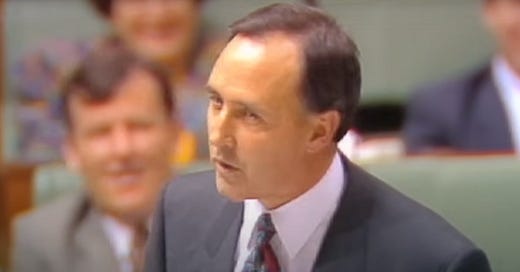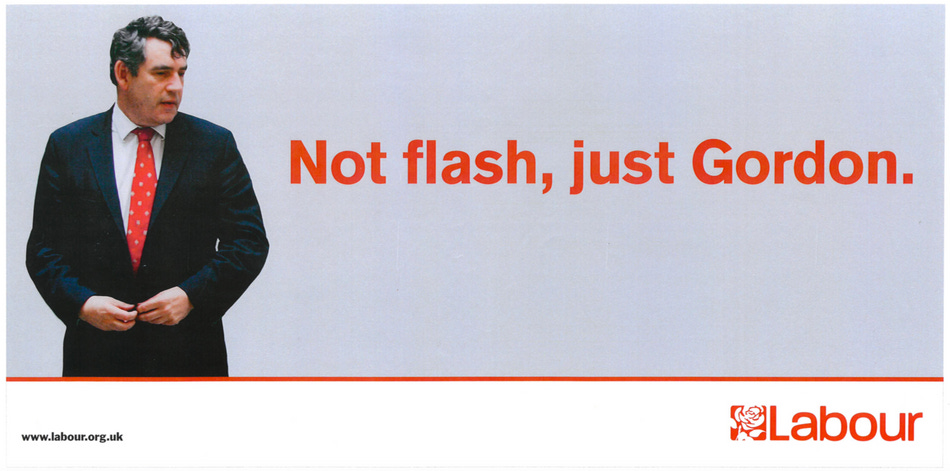'I wanna do you slowly'
The art of the political putdown – what Paul Keating understood that Gordon Brown never quite did
The similarities are, if anything, a little too on the nose. Both men were steeped in left-wing politics from an early age, were swiftly elected to parliament, served as finance minister for around a decade before toppling a charismatic rival who appeared to renege on a deal to step down as prime minister. The principal difference, of course, is that while Paul Keating won a general election in his own right, Gordon Brown never did. But why?
By the late summer of 2007, Brown found himself riding high in the polls. The new prime minister was seen to have responded well to a series of crises, from terrorist incidents to flooding. He was also considered something of an antidote to the smoothness of both his predecessor, Tony Blair, and leader of the opposition David Cameron. “Not flash, just Gordon” as the Saatchi & Saatchi poster nicely illustrated.
To that end, Brown contemplated calling an early election to secure a mandate of his own. But following the Conservative Party conference (you know, the one where George Osborne promised to raise the inheritance tax threshold on family homes to £1m) and a tightening of the polls, Brown decided against going to the country. Unfortunately, having allowed the speculation to reach fever pitch, this decision made him look weak and evasive.
At the following PMQs, Cameron smelled blood, and asked the question that could be seen from space:
The Prime Minister was asked, “Hand on heart, if the polls showed a 100-seat majority, would you still have called off the election?” and he said yes. Does he expect anyone to believe that?
Brown provided a painful non-answer, allowing Cameron to retort:
He is the first prime minister in history to flunk an election because he thought that he was going to win it!
Watch it here in all its cringe-inducing glory:
Let us turn now to how it is done. In the early 1990s, the Australian economy suffered its worst recession since the Great Depression, with unemployment rising to 11% and share prices falling by more than a third. Keating did not exactly help matters when, as treasurer, he called it “a recession that Australia had to have”. A party in power for more than a decade and having just overseen a painful economic contraction, Labor was unsurprisingly behind in the polls.
During Question Time on 15 September 1992, Liberal leader John Hewson asked the question all opposition leaders ask when the governing party is weak: Why won’t you call an early election?
What happened next has gone down in Australian political folklore, but it deserves the widest possible audience. Keating got to his feet, wearing one of those grey suits men wore in the 1990s, while on his face appeared barely concealed glee.
Did you catch that? A transcript does not do it justice, but for those who did not click, Keating said:
The answer is, mate, because I want to do you slowly. There has to be a bit of sport in this for all of us. In the psychological battle stakes, we are stripped down and ready to go. I want to see those ashen-faced performances; I want more of them. I want to be encouraged. I want to see you squirm out of this load of rubbish over a number of months. There will be no easy execution for you.
This was a political big beast finding himself in a corner, and loving every moment of it.
A well-timed, perfectly delivered gag was not the reason why Keating won in 1993 whereas Brown lost in 2010. Keating had the benefit of an opposition party saddled with an unpopular and frankly confusing policy prospectus, titled “Fightback!” Meanwhile, Brown had to contend with a Global Financial Crisis and the parliamentary expenses scandal.
Yet the contrast in style remains remarkable. Both men made the same sensible decision: do not call an early election you think you might lose. But where one adopted humour and went on the attack, the other appeared to be in denial. In any walk of life, humour can be a double-edged sword. But when deployed with skill and alacrity, it can mean the difference between political life and death.
Have a lovely weekend. I’ll be watching Declan Rice on repeat.







Keating was a natural born animal at rhetoric. True Okker Chic.